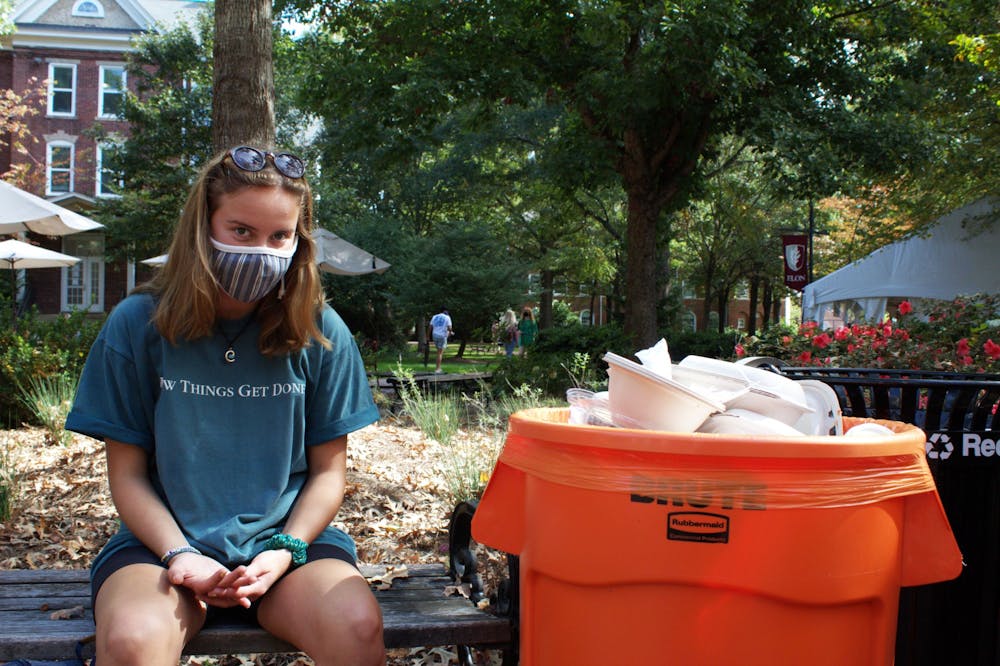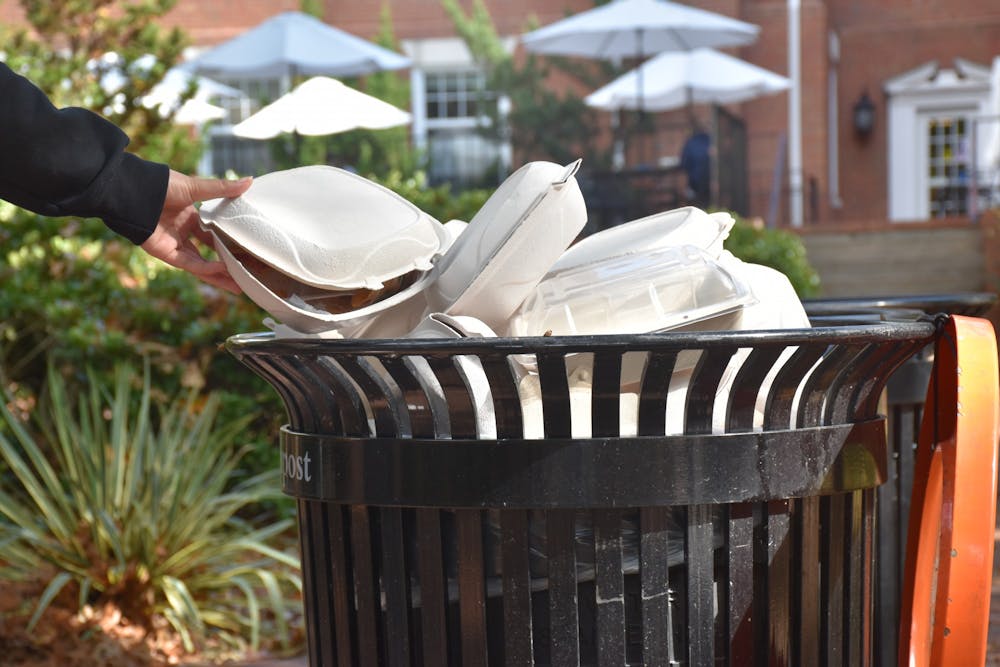Walking around campus, the effect of the pandemic on environmental waste is evident. Trash cans and compost bins outside of dining halls overflow with coffee cups and to-go boxes.
Elon junior Grace Contino worked as the sustainability intern for Elon Dining last school year when her internship was cut short due to the pandemic.
“It’s really discouraging to see all these to-go containers piled up in the trash cans around campus,” Contino said. “We had just started pushing the green, reusable to-go containers last year. Now they’ve had to take them away, and they make the argument that it’s for health reasons, but I kind of think it’s just an excuse.”
Only single-use containers are being used on campus this semester, as well as in the dining halls, as an effort to minimize the risk of transmitting COVID-19. Post-consumer compostable waste, such as used to-go boxes, is not currently being composted this fall semester due to challenges coming from COVID-19, according to the Elon sustainability website. In a sample stream of waste at the beginning of the semester, the higher volume of compostable waste also led to an increase in non-compostable contaminants. As a result, composting post-consumer waste has been put on hold.

While reusable containers are one way to mitigate environmental waste, many stores and restaurants — Elon Dining included — are not accepting reusable bags or containers due to transmission risks. Kelly Harer, assistant director of sustainability at Elon, said she agrees there are ways to focus more on cleanliness with reusables, but also finds importance in recognizing how certain priorities have shifted.
“The CDC has guidelines for disinfecting all of these reusables, so there is a way to reduce and reuse,” Harer said. “We should be doing that if we’re able to, but again, we’re all going through this. We will definitely move on from this. I think at that point it will be really important to say we did all these things for safety and we know we needed to do it.”
Harer said she struggled to maintain her focus on sustainable practices throughout the pandemic. Many of the Office of Sustainability’s events have had to be moved online, like Campus Sustainability week events and Eco-Rep information sessions in Elon 101 classes. To maintain a sense of normalcy, Harer has pushed for outdoor and physically distanced meetings in order to create a physical connection with the environment.
“I have consciously spent this semester focusing on mental health,” Harer said. “There’s a lot of research that shows if you’re able to get outside, it’s great for your mental health. The events we have been hosting, and that we’re hosting this week, are outdoors.”
A 2015 study by Harvard Health Publishing showed spending time in a natural outdoor environment can lower activity in the prefrontal cortex, often associated with repetitive negative thoughts. Additionally, those who have most recently experienced traumatic stress were seen to have the biggest mental health boost, which could connect to the heightened anxiety surrounding COVID-19.
Harer is integrating being outdoors with mental health and sustainability discussions to encourage a focus on students’ personal well-being. On Monday, Oct. 19, the Office of Sustainability held an eco-grief session at Loy Farm, focusing on sharing grief and struggles with the growing environmental crisis.
Contino attended this session and said during the spring, finding a balance between focusing on her own mental health throughout the COVID-19 pandemic and maintaining sustainable practices was a struggle. While people have gone outside more as a result of being stuck inside the house, they are also using more single-use plastic than before, according to the American Association for the Advancement of Science.
While this is one of the main ways waste is increasing on campus, Contino said there are ways in which people are becoming more aware of their environmental habits.
“I think during quarantine, people had more time to think about how they were living,” Contino said. “People are noticing what they do at home and how much food waste they create, how much plastic they might generate from takeout or ordering online. But people are also driving less, which is more environmentally sustainable.”
Contino also speaks on sustainable land use, and recalls moments from the beginning of the pandemic when native animals would roam the empty streets of cities they used to occupy. These moments that occurred as a result of COVID-19 really gave a different perspective to how we view the world and the way we use its resources, Contino said.
Elon University has had to make many changes on campus specifically, but there are other sustainability initiatives unaffected by the pandemic.
The university has a carbon neutrality goal set for 2037 and to track this process, the Office of Sustainability does yearly greenhouse gas inventories. This is done at the beginning of every summer, and Harer expects this upcoming summer’s reports to be lower than before due to decreased operations on campus. Of greenhouse gas emissions reported at Elon, 25% come from air travel emissions from study abroad, the majority of which have been canceled this year.
With bigger sustainability operations on campus maintaining regularity, landfill waste production is the main issue contributing to a greater environmental threat on campus. Harer said she wants to give students grace in this period though, as the pandemic contributes to excess stress and anxiety for students.
“I am okay with focusing on mental health as long as we need. I think that’s really important. I think that’s an important part of sustainability that people are missing out on,” Harer said. “We’re in a lot of converging crises, and so being able to do outdoor events, seeing classes being held outside are all really good to me and I hope they continue.”


